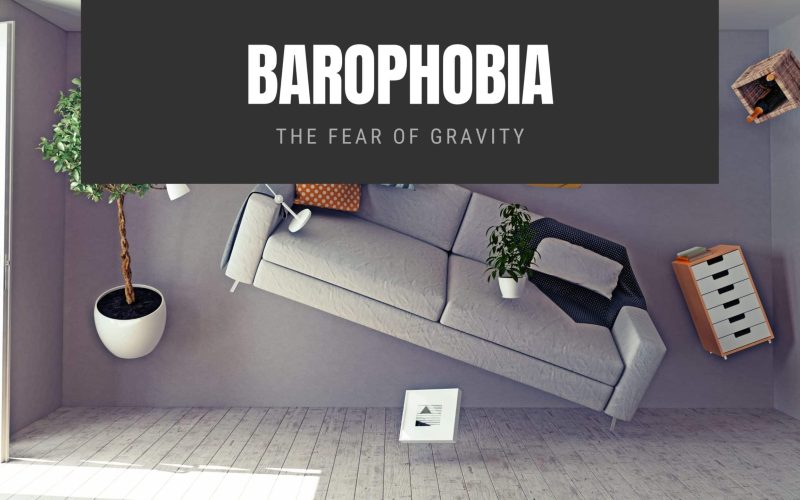Barophobia, which is the fear of gravity, is one of the most common phobias that we have. Barophobia is the irrational fear of falling. Some doctors also describe barophobia as the fear of gravity.
According to long-standing research based on evolutionary ideas, most humans are born with an innate fear of heights, often called acrophobia.
This is why many confuse barophobia and acrophobia. Some people often think they are the same thing but are two very different phenomena.
While barophobia is the fear of falling due to gravity, acrophobia is the fear of heights and tall buildings.
Like other phobias, people who suffer from this condition may often find that the mere thought of falling can cause them to begin to have severe anxiety and panic attacks. People who suffer from barophobia will discover that they are extra cautious of falling or dropping objects to the floor.
If you have barophobia, you will find it difficult to go to certain places or do certain things, especially things that have to do with relying on gravity. People who deal with specific phobias often realize that they spend most of their time trying to avoid their fears.
For example, people with space phobia (the fear of outer space)try to avoid books, novels, classes, or movies about space. The same thing happens to those who have barophobia.
They often find themselves trying to avoid gravity, which, in reality, cannot be completely avoided. The earth relies on gravity; hence, it is almost impossible to avoid gravity on this earth.
Because it is almost impossible to avoid gravity on this planet, people who have barophobia often have quite a challenging day-to-day lifestyle. This is because of the amount of anxiety that they would experience because of the intense fear of gravity they are always faced with.
In some extreme cases, they may often experience severe anxiety that can lead to full-blown panic attacks and cause them to be hospitalized.
Causes of Barophobia
Just like other phobias, there is no known cause of Barophobia. However, according to research, genetics and environmental factors play a significant role in developing this phobia.
For instance, if a person has anyone who is a close family member that has had barophobia or the person has a family history of mental illnesses, then that person has increased chances of developing barophobia.
According to some doctors, most people who have an increased risk of developing mental illnesses due to genetics often develop phobias, and barophobia could be one of them.
If a patient has a genetic predisposition to developing barophobia, it is only a matter of time before the person begins to exhibit signs of this condition. Once the person is exposed to the triggers of barophobia or a traumatic event, they can easily develop full-blown barophobia.
For example, certain traumatic events such as falling down a flight of stairs or from a tall building can cause the patient (who previously has the genetic markers of developing barophobia) to begin to exhibit signs of developing barophobia.
The person who fell down the flight of stairs may start to blame the earth’s gravitational pull for their fall and plummet and probably for the injuries they may have gotten from the fall.
Although this thought may seem quite illogical to another person, a person who suffers from barophobia will remain completely adamant about their claim of the earth’s gravity, making them fall.
It is important to note that most anxiety disorders if not all, bring along with them many irrational and unreasonable beliefs.
Symptoms of Barophobia
Just like other phobias, anxiety is one of the significant signs you will notice in a person having barophobia.
For most people who have barophobia, due to the fear they experience, they often don’t go to certain places or attend some functions because of where they are held.
They tend to try to avoid gravity. In some extreme cases, the anxiety they may feel may be so intrusive in such a way that due to their exposure to gravity, they may begin to experience full-blown panic attacks, which can be quite severe if the situation isn’t immediately controlled.
According to some psychiatrists, it is not uncommon to see that people who suffer from barophobia may also develop specific other fears such as apeirophobia (which means the fear of infinity) and space phobia (which is the fear of outer space.)
Some may even develop acrophobia (the fear of heights) alongside these other phobias, making the situation very complicated.
Most of the common symptoms a person who suffers from Barophobia will experience include:
- Intense anxiety when having thoughts of gravity
- When trying to fight and resist gravity actively, the patient might experience anxiety.
- They often express their inabilities, which are often a result of their failure to deal with their conditions. Sometimes, some can’t cope with their anxieties.
- Some people may experience muscle tension, sweating, and shakiness of both hands and legs.
- In extreme cases, some may experience panic attacks.
Treatment
Since barophobia has no known cause, it is difficult to prescribe a particular line of treatment that will help in reducing the symptoms.
However, several forms of treatments have been tried and tested to show that they help the patient live with his/her phobia.
Most of these treatments are either Exposure Therapies, Cognitive Behavioural Therapy, as well as the use of psychiatric medications. These treatments have been seen to help people with barophobia.
1. Exposure therapy
Exposure therapy is one of the most common forms of treatment that is used to treat almost all kinds of phobias. Exposure therapy is done by exposing the patient to his current fear in a controlled manner.
When dealing with barophobia using exposure therapy, your therapist will gradually expose the patient to things that speak about his anxiety. For example, a person who has barophobia is afraid of gravity.
If the therapist wants to use exposure therapy to help treat his patient, he will gradually expose the patient to gravity by introducing the person to videos that depict the gravitational force of the earth.
Although videos naturally such videos aren’t supposed to cause anxiety, for someone who is dealing with barophobia, when they are exposed to such video footage, they become very frightened and anxious.
However, when the therapist does this, he or she gradually introduces the videos to the patient and helps them understand that their fear is irrational.
2. Cognitive Behavioural Therapy
Another treatment method that has proved useful when dealing with phobias is Cognitive Behavioural Therapy (commonly called CBT). In CBT, the patient explains why he or she feels the way he or she does regarding gravity.
CBT is often referred to as a psycho-social intervention whose sole aim is to help improve people’s mental state. It is a treatment that is often employed to treat people who suffer from anxiety disorders such as OCD and so on.
Someone who suffers from barophobia will benefit a lot from using CBT. This is because your therapist will help you understand why you feel how you feel.
It will help them better understand their fears and come to terms with the fact that their anxieties could indeed be irrational.
3. The Use of Medications
In some cases, doctors can prescribe either antidepressants or anti-anxiety meds to help you deal with the barophobia. These drugs are often very helpful.
i. Anti-anxiety Medications
Anti-anxiety meds are drugs that are very useful in reducing panic attacks. In some cases, they help to prevent it before it comes up. For people who suffer from extreme barophobia, these drugs are beneficial and highly recommended.
Some common anti-anxiety medications your doctor may prescribe to you include Valium, Xanax, Klonopin, and so on. These types of drugs are not sold as over-the-counter drugs, and they must not be taken daily. So, before you decide to buy the medications, you must discuss their possible side effects with your doctor.
ii. Antidepressants
Many mistake antidepressants for drugs to be used only by people who have depression. However, this school of thought is often very wrong. While antidepressants although help someone reduce the tendencies of getting depressed, it can also help people suffering from phobias.
Common antidepressants that most doctors prescribe include Paxil, Zoloft, Lexapro, and so on. These drugs are meant to be taken daily, and they can help prevent panic attacks from occurring.
Before getting these drugs, it is essential to talk to your doctor about it to know if it is okay to take antidepressants alongside the Anti-anxiety medicines and if there are no side effects.
References;
- Barophobia (the fear of gravity); Psychtimes
- Barophobia counselling; Tranceformpsychology





